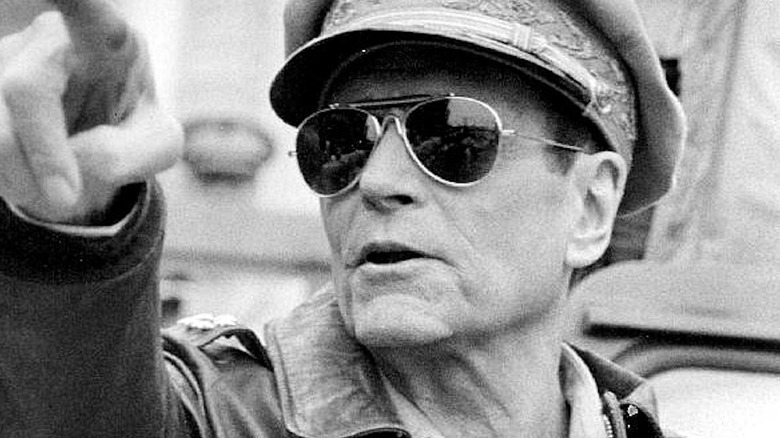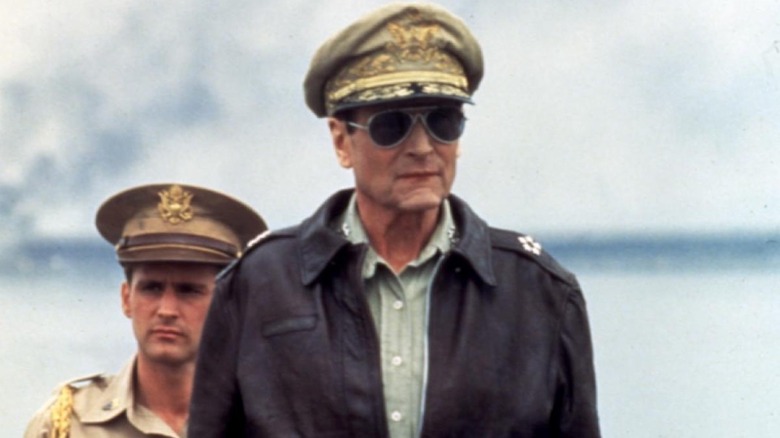An '80s War Movie Starring Laurence Olivier Lost Its Studio Over $40 Million
Laurence Olivier was the greatest Shakespearean actor of the 21st century, an unrivaled master of technique who brought the Bard to the big screen with an invigorating cinematic bravado and refreshing absence of preciousness. Olivier was a sensation on the boards, but he came to believe in the power of movies and, via such masterpieces as "Hamlet," "Richard III," and "Henry V," made a strong case that these works belonged to everyone, regardless of their economic or cultural upbringing.
Olivier's openness to the movies during the advent of the talkies perturbed some of his most valued colleagues. Noël Coward, the boundlessly witty playwright who gave us "Blithe Spirit," "Private Lives," and "Design for Living," once told his friend, "You've no artistic integrity, that's your trouble; this is how you cheapen yourself." Coward might've had a point in that Olivier, at the time of this comment, was mulling an RKO contract offer that would've paid him, adjusted for 2025 inflation, a little over $1 million a year, i.e. far below his market value considering the esteem in which he was held. (For two films a year, he should've been making twice that sum.) But Olivier did not yet respect the medium, so it's possible that he agreed to pay that he felt was commensurate with the value of the medium.
40 years later, Olivier knew his value and wasn't taking discount offers. He did ads for Polaroid and took supporting parts in studio productions like "Marathon Man" (where he memorably tortured Dustin Hoffman), "A Bridge Too Far," and "Dracula." For people who'd long believed Olivier to be the finest actor on the planet, it was dispiriting to see him winding down in for-hire gigs — even though he never phoned in a performance. These roles were not worthy of the man who'd been nominated for 10 Academy Awards throughout the course of his brilliant career, winning Best Actor for his legendary portrayal of the troubled Dane in "Hamlet."
Moviegoers could take Olivier lending his prestige to trifles like "Clash of the Titans" and "Wild Geese II," but they could not sanction his involvement in a Korean War epic financed by the religious cult leader Sun Myung Moon. This production had disaster scrawled all over it, and it more than delivered on this dubious promise.
The exorbitant price of Inchon was right for Laurence Olivier
In the 1970s, Sun Myung Moon, the tax-cheat founder of the clownish Unification Church (which had become a worldwide punchline for its mass weddings and doctrine that claimed Moon had been personally ordered by Jesus Christ to continue the messiah's good work), was eager to get into the motion picture business. At the time, the movies were still the most dynamic way to disseminate propaganda, which is essentially what Moon was up to with "Inchon." Ostensibly a grand combat epic centered on the pivotal Battle of Inchon, it was really an attempt to burnish the tarnished reputation of General Douglas MacArthur.
The film wound up costing an absolutely-wild-for-1981 $46 million, but it was at least left in the hands of proven professionals like director Terence Young (who helmed "Dr. No," "From Russia with Love," and "Thunderball") and Oscar-nominated cinematographer Bruce Surtees. Alas, the production was plagued by delays and snafus (like an entire fleet of very real battleships turning in the wrong direction, which led to one of the most demoralizing, and expensive, "back to one" resets of all time), as well as post-production meddling from Moon, who had no filmmaking experience.
After a disastrous Washington D.C. premiere in 1981, the film was shelved until September of 1982, where it was met with a barrage of hostile reviews. Critics were stunned by the unremitting ineptitude of the movie, which looked like its journey from the 140-minute premiere cut to the 105-minute theatrical release had been guided by someone who did not understand basic film grammar. They were also aghast at the career-worst performances turned in by Jacqueline Bisset, Ben Gazarra, Toshiro Mifune, and Richard Roundtree.
If reviewers were inclined to be at all charitable toward "Inchon," they spared a kind word for Olivier, whose portrayal of the hard-nosed General MacArthur was decidedly more nuanced than Gregory Peck's stiff work in 1977's "MacArthur." Still, people were appalled that he'd wasted his time and talent on a world-class stinker (one that grossed a paltry $5.2 million domestically). Olivier was prepared for such objections and explained his decision in an interview at the time of the film's release. Per the master thespian:
"People ask me why I'm playing in this picture. The answer is simple. Money, dear boy. I'm like a vintage wine. You have to drink me quickly before I turn sour. I'm almost used up now and I can feel the end coming. That's why I'm taking money now. I've got nothing to leave my family but the money I can make from films. Nothing is beneath me if it pays well. I've earned the right to damn well grab whatever I can in the time I've got left."
Olivier was paid $1 million for six weeks of work on "Inchon." Noël Coward would've scoffed, but he was incredibly dead in 1982.

